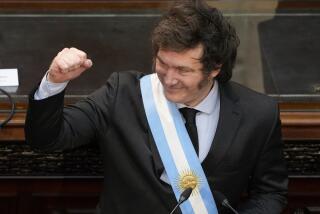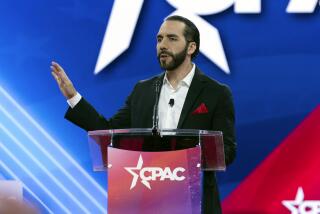From the archives: U.S. Troops May Join Colombia’s War on Drugs
WASHINGTON -- Atty. Gen. Dick Thornburgh on Sunday praised Colombia’s new willingness to extradite drug criminals to the United States and said that the Bush Administration has not ruled out sending U.S. troops to that country to assist in its war on narcotics traffickers, if such help is requested.
“I think we have to look at any request that we get for either law enforcement or military assistance seriously,” he said, adding that recent acts of terrorism in Colombia, including Friday’s assassination of Sen. Luis Carlos Galan, the front-running presidential candidate, “have really brought that country to its knees as far as enforcing its own laws.”
“We stand ready to help,” he said.
Galan, 46, the leading candidate to represent the country’s ruling Liberal Party in presidential elections next year, was slain by seven men with submachine guns as he prepared to address a campaign rally outside Bogota on Friday night. Galan had angered Colombia’s powerful drug cartels by supporting extradition of narcotics traffickers to the United States.
Colombian President Virgilio Barco Vargas announced a major anti-drug program Saturday, which included his vow to use emergency powers to revive a suspended extradition treaty with the United States so that drug traffickers can be tried here if charges originate in this country.
May Need Outside Help
Thornburgh, speaking on NBC’s “Meet the Press,” said that if Colombia’s leaders reach a point where they believe that “they can no longer operate under the rule of law and have to use the rule of force, then they’re going to require all the help they need against internal threats from the drug traffickers.”
He also said that the United States would respond “just as we respond around the world . . . to requests with regard to that type of activity by political revolutionaries.”
Meanwhile, in Colombia, police and military officials arrested nearly 4,000 people over the weekend in a nationwide hunt for drug traffickers linked to the murder of Galan. Most of those arrested were considered low-level figures in the drug network, and it is not known if suspects in Galan’s slaying are among them.
Officials also said that authorities had confiscated 260 guns and 522 vehicles, apparently the property of drug traffickers or hired thugs. However, they said that no cartel leaders had been found among those arrested.
Police were also hunting the slayers of an appeals court judge, shot Wednesday night, only hours after he upheld an arrest warrant for alleged Medellin cartel leader Pablo Escobar.
Colombian courts nationwide have been shut down by a judges’ strike since Thursday. The judges are protesting the violence that has left several of their colleagues dead.
Funeral Procession
More than 50,000 people lined the route of Galan’s funeral procession Sunday, many chanting slogans calling for his killers to be brought to justice.
The mourners filled a square in front of the Bogota cathedral, many waving white handkerchiefs, while Cardinal Mario Rebollo read a statement from Pope John Paul II laying the blame for the murder on Colombian drug lords.
“The sad news of the brutal assassination committed by drug traffickers against Luis Carlos Galan provoked within me feelings of pain and condemnation,” the Pope said.
Security was unusually tight, with about 1,000 police officers along the two-mile funeral procession route.
Thornburgh acknowledged in the television interview that there is opposition from the U.S. Joint Chiefs of Staff to using military forces to intervene in Colombia’s drug strife, but he said, “What the military does oppose, I think, is the translation of their activities, which are involved in protecting our national security, into a law enforcement function. We’ve always made a very careful distinction in our country, both at home and abroad, between what the legitimate role is of law enforcement and what the legitimate role is of the military.”
Cooperative Effort
The U.S. military, he said, has been involved in drug wars in other South American countries, such as Operation Blast Furnace several years ago in Bolivia, in which U.S. helicopters participated in a cooperative effort to destroy cocaine-processing laboratories in that nation’s jungles.
“I don’t think that we ought to respond, as some suggest, willy-nilly, with a military response, but I do think that’s an option we have to keep open in order to, among other things, maintain good relationships with our neighbors in establishing collective security operations,” he said.
Thornburgh also said he was pleased that President Barco had decided to reinstate the extradition treaty and said that the Justice Department has begun discussions with the State Department and with U.S. attorneys “who are handling these particular cases, so we will be in a position to act when any one or more, we hope, of these major cartel traffickers are taken into custody in Colombia.”
Thornburgh said that there are about a dozen “major kingpins we’re looking at” for extradition.
Officials from the U.S. Marshals Service said Sunday that the agency has valid warrants for at least 52 Colombian drug figures. They are wanted for trial in more than 25 federal judicial districts around the United States, including Northern California, New York, Alabama and Florida.
‘Significant Opportunity’
Referring to Barco’s statements Friday that came in the wake of the violence--which also included the assassination of a Colombian police chief--one federal law enforcement official said Sunday, “This is probably the most significant opportunity we’ve had in a long time--at least since the invasion of the Supreme Court.”
He was referring to the assault by politically inspired terrorists on the Colombian Supreme Court in 1985, which left 115 people dead, including 11 Supreme Court justices. The Medellin cartel--the South American nation’s most feared drug cartel--is believed to have played a role in the assault.
“These people have been known to travel out of Colombia,” said another law enforcement official, indicating that they could be captured in a third country and brought back to the United States for trial. “They don’t just sit down there in bunkers.”
The official, who declined to be identified, also said that despite Barco’s extradition decision, it still might be easier to arrest the suspects in a country where the drug cartels do not exercise as much direct power as they do in Colombia.
He cited as an example Medellin cartel leader Jorge Ochoa, who was twice apprehended in Spain and later traveled to Venezuela while being sought by U.S. authorities. Ochoa is still wanted on federal charges in the United States.
In other comments, Thornburgh indicated that it is unlikely the Bush Administration, as part of its upcoming drug strategy package, will support legislation requiring drug testing for individuals who purchase guns.
Underground Market
“The problem with that is that most sales of guns and most acquisitions of guns by criminals does not take place at the local sporting goods store,” he said. “It takes place in an underground market, and you’d have a very difficult time administering drug tests in that kind of activity.”
However, he said that a mechanism to coerce states into revoking the drivers licenses of drug abusers is a “legitimate option” under consideration.
“The governors themselves and other state and local officials are strongly committed to an effective war on drugs,” he said. “And already there’s been voluntary compliance in a number of states by establishing rules that would take away or deny auto licenses to those who abuse drugs.”
Nevertheless, he added, President Bush will “probably talk to the governors and get their views before he acts on it.”
Times staff writer Ronald J. Ostrow contributed to this story.
More to Read
Start your day right
Sign up for Essential California for news, features and recommendations from the L.A. Times and beyond in your inbox six days a week.
You may occasionally receive promotional content from the Los Angeles Times.






